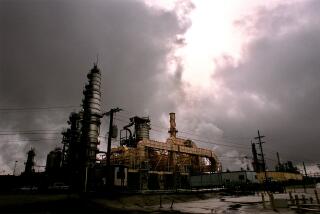20% Increase in OPEC’s Income Is Seen for 1987 : Would Be Cartel’s First Yearly Gain Since 1980
- Share via
BRUSSELS — For the first time since OPEC began losing a grip on oil prices at the start of this decade, the cartel’s income in 1987 was higher than the year before, according to industry estimates.
Even so, its income total was the second-lowest since 1973, when an oil boycott against the United States by Arab members of the Organization of Petroleum Exporting Countries catapulted the cartel to global power.
Helped by a boost in prices, OPEC’s 1987 oil export income was roughly $93 billion, or about one-fifth higher than the year before, according to Stephen Turner, an oil specialist at the investment firm Wood, Mackenzie & Co., in Edinburgh, Scotland.
It was the first such improvement over the preceding year since 1980, when the cartel’s revenue surged to a record $287 billion as prices were peaking. An oil glut began developing the following year and OPEC entered a troubled period in which both prices and production fell sharply.
No official figures are available yet from OPEC on its 1987 production or income.
The improved oil revenue was a welcome change for the cartel, even though the gains were largely eroded by inflation and the effects of a sharply lower U.S. dollar, the currency in which oil is sold.
Outlook Not Bright
Standards of living in the 13 member countries were set back severely by a 1986 price collapse that cut OPEC’s collective income in half.
Despite the modest recovery in 1987, the outlook for OPEC is not bright.
The cartel enters the new year with serious internal divisions, mounting strains on its price and production strategy, and only faint hopes of managing a second straight year of significantly higher oil revenues.
Turner figures that OPEC’s revenue in 1988 will be about $99 billion, a slight gain that would be wiped out by even a small price decline.
Few are predicting a repeat of the 1986 debacle, when oil prices fell to below $10 from $28 a barrel, but analysts said in interviews this week that OPEC faces an uncertain 1988.
“It all could go crashing down again,” said Paul McDonald, a London-based oil consultant.
McDonald said oil prices probably would fluctuate between $15 and $18 a barrel if OPEC maintained at least a semblance of unity. If not, prices could tumble below $10, he said.
At their regular winter meeting in December, OPEC oil ministers failed in six days of negotiations to persuade Iraq to join a collective agreement on production controls. Instead, the cartel announced on Dec. 14 that it would extend its existing structure of prices and production controls--without Iraq--through the first half of 1988.
In the past year, Iraq boosted its production by more than 50% to make it the second-largest producer in OPEC after Saudi Arabia.
Analysts said there appeared to be little chance that other OPEC members, such as the United Arab Emirates, would stop cheating on their production quotas as long as Iraq remained outside the cartel’s accord.
Besides the standoff between war foes Iran and Iraq, both OPEC members, the key obstacle to OPEC succeeding in regaining a measure of control of oil prices is the financial pressures that are building in all the member countries.
Rilwanu Lukman, the OPEC president and Nigeria’s oil minister, underscored this in his opening address to the December meeting, noting that OPEC was producing oil at half its capacity.
More to Read
Inside the business of entertainment
The Wide Shot brings you news, analysis and insights on everything from streaming wars to production — and what it all means for the future.
You may occasionally receive promotional content from the Los Angeles Times.










